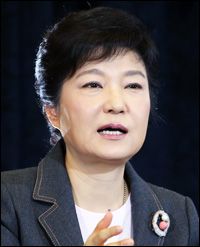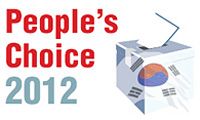Will OECD data help Park?
Will the latest Organization for Economic Cooperation and Development (OECD) data have any relevance for the 2012 presidential election?
The wealthy nations’ club said that Korean women suffered from the largest gender gap in wages among member countries.
This signifies that they are discriminated against but it is still a moot point whether or not women are inclined to vote for Park Geu-hye of the ruling Saenuri Party over Moon Jae-in of the main opposition Democratic United Party.
Park is the 60-year-old unmarried daughter of former President Park Chung-hee, and is fully playing the gender card. But the problem is that there is no significant evidence that women voters see Park as their savior.
According to a report by the OECD released Friday, Asia’s fourth-largest economy found its gender income gap to be 39 percent, the highest among the 28 surveyed member nations as of 2010. It means that Korean women are paid 39 percent less than their male counterparts. The average of OECD nations was 15 percent.
The gap in 2000 was 40 percent, also topping the OECD list at that time, meaning the disparity has barely narrowed over the past decade.
Japan came next with a gender wage gap of 29 percent, while Germany and Israel tied at third with 21 percent. The United States, Canada, Finland, Switzerland and Austria marked an income gap of 19 percent, according to the report.
The OECD data also showed that Hungary and Poland had the lowest gender pay gap of 6 percent each, followed by New Zealand with 7 percent, Norway with 8 percent and Belgium with 9 percent.
Experts said Korea’s gender pay gap is due to a tough job market for women and poor social services for working moms.
Korean women typically quit their jobs after marriage to concentrate on having children and their children’s education. Many of them return to work as non-permanent workers who are not entitled to full-time benefits.
State data showed 36 percent of salaried women were non-permanent workers last year and their contracts with employers are renewed every year.
“We need more efforts to create better jobs for women along with the expansion of social services,” said Kim Young-ok, a researcher at the Korean Women’s Development Institute. “European countries have good social welfare systems and the public sector provides quality job opportunities and absorbs female workers.”
Earlier, other data showed the nation still has a long way to go before ensuring equality between the sexes in the corporate hierarchy.
Information released by the Financial Supervisory Service and Statistics Korea in August showed that women hold only a combined 12 seats on the boards of the country’s 100-biggest companies. The 12 women account for just 1.5 percent of the 801 seats occupied by men, it showed.
Korea’s female board member ratio is far below European counterparts. Women there made up 11.7 percent of boards in the region’s top 300 companies in 2010, up from 9.7 percent in 2008, according to the European Professional Women’s Network. <The Korea Times/Park Si-soo>


























































